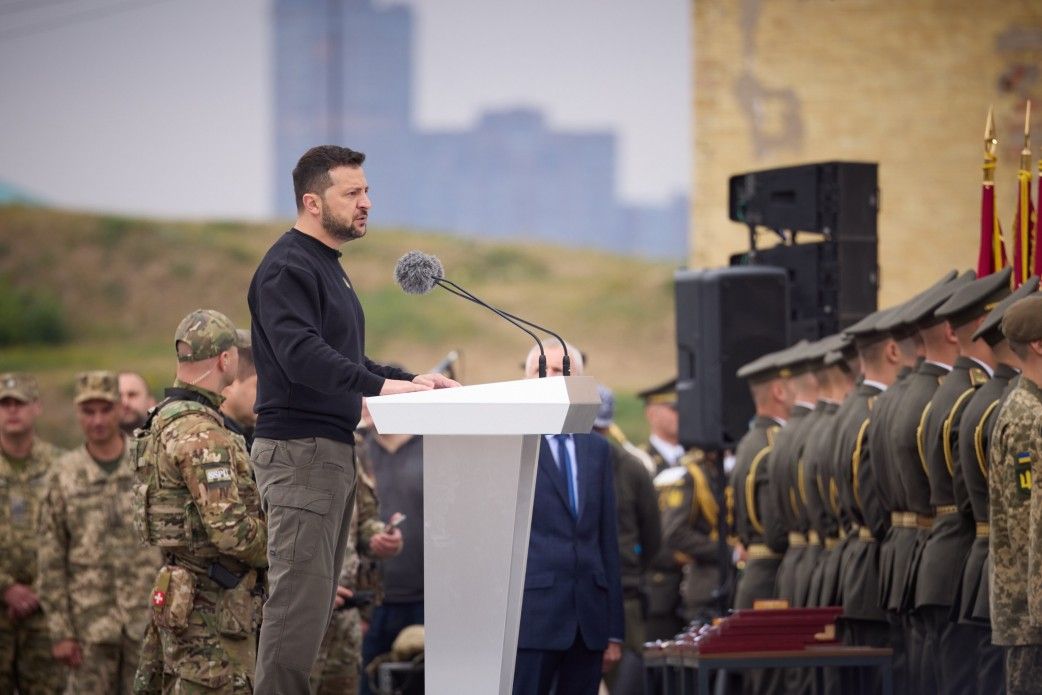In audio intercepts from the front lines in Ukraine, Russian soldiers speak in shorthand. They describe 200s to mean dead, 300s to mean wounded, and 500s to describe people who refuse to fight.

apnews.com
Intercepted calls from the front lines in Ukraine show a growing number of Russian soldiers want out
BY ERIKA KINETZ
Updated 1:04 AM EST, November 26, 2023
In audio intercepts from the front lines in Ukraine, Russian soldiers speak in shorthand of 200s to mean dead, 300s to mean wounded. The urge to flee has become common enough that they also talk of 500s — people who refuse to fight.
As the war grinds into its second winter, a growing number of Russian soldiers want out, as suggested in
secret recordings obtained by The Associated Press of Russian soldiers calling home from the battlefields of the Kharkiv, Luhansk and Donetsk regions in Ukraine.
The calls offer a rare glimpse of the war as it looked through Russian eyes — a point of view that seldom makes its way into Western media, largely because
Russia has made it a crime to speak honestly about the conflict in Ukraine. They also show clearly how the war has progressed,
from the professional soldiers who initially powered Vladimir Putin’s full-scale invasion to men from all walks of life compelled to serve in grueling conditions.
“There’s no f------ ‘dying the death of the brave’ here,” one soldier told his brother from the front in Ukraine’s Kharkiv region. “You just die like a f------ earthworm.”
The prospect of another wave of mobilization lingers, even as Moscow has been trying to
lure people into signing contracts with the military. Russia’s annual autumn conscription draft kicked off in October, pulling in some 130,000 fresh young men. Though Moscow says conscripts won’t be sent to Ukraine, after a year of service they automatically become reservists — prime candidates for mobilization.
An unknown soldier speaks to his brother about the war.
The AP verified the identities of people in the calls by speaking with relatives and soldiers — some of whom are still at war in Ukraine — and researching open-source material linked to the phone numbers used by the soldiers.
The conversations, picked up in January 2023 — some from near the
longest and deadliest fight in Bakhmut — have been edited for length and clarity. Names have been omitted to protect the soldiers and their relatives.
The voices in these calls are of men who didn’t or couldn’t flee mobilization. Some had no money, no education and no options. Others believed in patriotic duty. One worked in a meat processing plant, cutting bone. Another worked at a law firm. A third, who worked as a roofer and later at a supermarket company, had a string of debts and had defaulted on his utilities payments, records show.
It is hard to say how representative these calls are of sentiment in
Russia’s armed forces, but their desperation is matched by a spike in legal cases against soldiers in Russia who refuse to fight.
What’s happening in Ukraine is “simply genocide,” the soldier in Kharkiv told his brother. “If this s--- doesn’t stop, then soon we’ll be leading the Ukrainians to the Kremlin ourselves,” he said.
“This is just a huge testing ground, where the whole world is testing their weapons, f--- it, and sizing up their d----,” he went on. “That’s all.”
But there are other voices, too, of men who remain committed to the fight.
“As long as we are needed here, we will carry out our task,” a soldier named Artyom told AP from eastern Ukraine at the end of May, where he’d been stationed for eight months without break. “Just stop asking me these stupid questions.”
The Kremlin and Russian Ministry of Defense did not respond to requests for comment.
(AP Illustration/Peter Hamlin)
SOLDIER: ‘BONES, TEARS — ALL THE SAME, THEY ARE THE SAME AS WE ARE’
When he finally got to go home, it came at a terrible price: his brother’s life.
Nicknamed “Crazy Professor” because of his disheveled hair, he was swept up in the first days of Russia’s September 2022 draft. The soldier said he was assured that he wouldn’t see combat and would get to go home every six months.
Neither turned out to be true.
After a few weeks of training, the Professor was sent to the front line near Bakhmut as a mortarman. He wanted out almost immediately. He was ill-equipped, at least compared to the well-camouflaged Wagner soldiers wandering around.
“They have night vision and automatic rifles with cool silencers. I have an automatic rifle from 1986 or hell knows what year,” he told his brother in a January phone call.
It was his job to aim, but the Russian army’s coordinates were so sloppy that soldiers ended up killing each other.
The Professor said his commander instructed them not to kill civilians, but who was a civilian and who was a combatant? Even a kid could carry a grenade, he told his brother. Where did the mortars he fired land? Had he killed children?
The worst was when he was out with young guys in his unit. There was just a strip of woods between them and the Ukrainians.
“I imagined that there, on the other side, there could be young people just like us. And they have their whole lives ahead of them,” he told AP in June. “Bones, tears — all the same, they are the same as we are.”
The Professor told himself he didn’t really have a choice: Either fire the mortar or face criminal charges and end up in a pit or a prison.
“If you don’t like something, if you refuse to do something, you’re considered a refusenik,” he told AP. “That is, you’re a ‘500’ right away. … So we had to follow orders. Whether we wanted to or not.”
The Professor never thought he’d be a refusenik one day too.
___
The Professor: The worst thing is that there might even be children there, you know.
Brother: And what can you do. … You have your orders. … It seems to me that if it had been voluntary, you wouldn’t have gone.
The Professor: You know, I’m glad about that. Plus, we did such a good job that they gave us a car. The downside is, you know, how many lives were ruined for the sake of a car?
Brother: Not of your own free will.
The Professor: I’m already so tired.
Brother: I believe it. Time to come home. I wish you could come home. Not so that you could home but so that all of this could be over already.
___
In the spring, as the Professor’s brothers drove down a road outside their hometown in Russia, a car made a U-turn into the side of their vehicle, sending it spinning as a semi bore down on them.
One brother was killed. Another survived but now cannot walk, family members told AP.
Desperate to go home to bury his brother, the Professor said he got approval from his commander for a 10-day leave. Military police in Russian-controlled territory in Luhansk let him through, he said, and he paid for his own taxi ride home. Once he got back to Russia, however, he was told he didn’t have the right paperwork.
Not long after the funeral, the Professor got a message from his commanding officer: “What is happening there? Are you going to come back or stay there?”
“I’ll collect the documents, and then we’ll decide everything,” he wrote back.
Two hours later, around midnight, his commander responded: “I’m reporting you as AWOL, unauthorized abandonment of the unit. It was nice fighting together.”
Now he faces up to 10 years in prison.
He hired a lawyer. Months into a 10-day leave, he can’t even apply for an extension to legalize his stay and help his family because he doesn’t have the right documents. He said his brother can move around on his arms and mostly get into his wheelchair by himself, but can’t function independently.
People from the military came to his home, he said. Terrified they’d arrest him if he went outside, he passed documents attesting to the dire state of his family’s health to them through the window.
His lawyer told him to look on the bright side. “You are the only, well, how do I put this … at least, you’re the only healthy person here.”
His mother is at the end of her endurance.
“I write everywhere, I call everywhere, too. Because he was told that he has to return to his unit,” his mother told AP. “But how can he leave his brother? I have no one.”
Now, the Professor has visions of dead people. They stare back at him. He can almost hear them walking nearby. Sometimes he bolts awake at night, sweating, or dives under the covers at the sound of a whistle.
He wants his old life back, that sweet time he had with his wife and baby. He has picked up some roofing work at construction sites, and his neighbor proposed a new side job: digging graves.
(AP Illustration/Peter Hamlin)
ARTYOM: ‘EVERYBODY’S F------ MAD, F------ GLOOMY AS HELL’
Artyom left behind a string of debts in Russia. Things got even worse in Ukraine, where it was so cold he couldn’t wash his underwear and his lighter kept freezing.
“It’s not like I’m having any f------ fun here, day in day out. It’s been f------ four months already,” he told his wife in January. “Everybody’s f------ mad, f------ gloomy as hell.”
It was New Year’s Day, and the Russians were getting bombarded by Ukrainians and not even firing back, he said.
“Yesterday we were f------ bombarded, for f---’s sake, we didn’t even get a single shell out, not a single f------ shell,” he told his wife.
The war seemed senseless to him. Why wasn’t Putin satisfied with Crimea? What business did they have trying to take Kharkiv and Kyiv? Why was everyone lying about how great things were at the front?
No one was saying the one thing he wanted to hear: that he could go home.
Artyom talks with his wife.
___
Artyom: Yesterday we were listening to the radio and someone f------ said, “the situation with mobilized soldiers is f------ wonderful.” I don’t know who the f------ idiot is who said that. “Only five thousand people died.”
Wife: Mhm. Of course.
Artyom: F------ s---heads. I think half of them are probably gone at this point.
Wife: Right.
Artyom: Five thousand people my ass.
___
Artyom doesn’t have much sympathy for draft dodgers and deserters, though he can see the wisdom in making a run for it.
“That’s what you have to do, given the chance,” he told his wife. “This is not the best f------ place to be … But then they’re gonna say you’re a f------ freak who ran away. I don’t f------ need that.”
He told her he’ll stay put and follow orders. “If God wills it so that you’re gonna f------ die, you’re gonna f------ die, can’t do much about it.”
The AP reached Artyom by phone at the end of May. He was still in eastern Ukraine, where he’d been serving for eight months without break.
Artyom said he’d been “a little worn out mentally” when he was speaking with his wife. He said he loved his family before the war and loved them even more now. He regrets he didn’t spend more time with them.
“I have to save the guys who are with me in the trenches — and myself,” he said. “That’s what I want to do. And to put down the Ukrainians faster and go home.”




